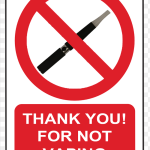Anti-vaping activists have put themselves in an awkward position. They want to demonize e-cigarettes because, they allege, nicotine poses a risk to teenagers. But they also want teenagers to use nicotine gums and patches to quit smoking. What sense does that make? None.
vaping
The media reports the results of sloppy vaping research, then quickly forgets them. We do not. What follows is a list of many of the low-quality studies that have investigated the alleged health risks of e-cigarette use. We'll regularly update this catalog of bad studies as necessary.
E-cigarettes can help smokers abandon their deadly habit. Unfortunately, that message has been buried under a mountain of anti-vaping messaging promoted by tobacco researchers and reporters.
The FDA recently attempted to ban JUUL vaping products and announced a proposal to cut nicotine levels in combustible cigarettes. The policies are designed to reduce tobacco use—but will they? We have our doubts. Join us for episode 10 of the Science Dispatch podcast.
Has the FDA lost its mind or just the ability to use it? ACSH advisor Dr. Jeffrey Singer discusses banning of Juul e-cigarettes.
The FDA has just effectively banned the most popular brand of e-cigarette products, encouraging many ex-smokers to restart their deadly habit.
Federal regulators and anti-tobacco campaigners are on the warpath against flavored vaping products. Though alcohol and marijuana use are more common (and more harmful) teenage vices, there seems to be little interest in restricting access to these products.
A new study sheds light on a worrying trend at the Food and Drug Administration: the agency appears to be funding low-grade vaping research and using it to justify strict e-cigarette regulation.
A recent study suggests that vaping is much less harmful than smoking. The authors and the journal that published the paper tried to minimize this result. Do they have an anti-vaping bias?
In order to preserve their "independence," a growing cadre of medical journals is refusing to publish any research conducted by vaping-industry scientists. It's a policy marred by hypocrisy that will exclude good science from the peer-reviewed literature.
A surprisingly large percentage of physicians have recommended vaping as a safer alternative to their smoking patients, a new study shows. The results suggest that many doctors have parted ways with the abstinence-only approach to smoking cessation championed by tobacco-control activists.
The evidence clearly shows that vaping helps many smokers quit cigarettes. Naturally, federal regulators and state legislators are trying to kill the e-cigarette industry.











